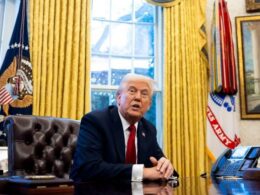Unlock the Editor’s Digest for free
Roula Khalaf, Editor of the FT, selects her favourite stories in this weekly newsletter.
Instagram co-founder Kevin Systrom has accused Mark Zuckerberg of throttling the photo-sharing app in testimony that backs up antitrust regulators in a monopoly trial that could lead to Meta’s break-up.
A key witness called by the US Federal Trade Commission, Systrom on Tuesday told a federal court in Washington that Meta failed to provide sufficient resources to realise Instagram’s growth potential after acquiring it in 2012 for $1bn.
The accusations hit at the heart of the case brought by the antitrust agency, which has accused Meta of building and retaining a monopoly in part via the acquisition of nascent rival Instagram.
The FTC alleges that Meta later sought to stymie the app’s growth to avoid Facebook’s “network collapse”, according to a confidential email written by Zuckerberg in 2018 presented to the court.
Systrom said Zuckerberg’s belief that Instagram was “hurting Facebook’s growth” was a “major driving force” behind the Meta chief’s decision in 2018 to cut off a number of tools initially provided by Meta after the takeover to help Instagram grow.
“There was dramatic softness in terms of [Facebook’s] US daily active users and everyone had their theories why,” he added. “Mark Zuckerberg and [Meta executive] Chris Cox believed it was Instagram’s growth that had by and large contributed to the softness”.
Systrom told the court that Meta’s failure to provide the staff he thought were necessary to grow Instagram was “one of the reasons” he left in 2018.
The FTC lawyer presented an email written by Systrom in 2017 about the staff Meta was allocating to boost the development of video. “We were given zero of 300 incremental video heads which is an unacceptable and offensive outcome,” Systrom wrote.
Systrom quit alongside Instagram’s other co-founder Mike Krieger in September 2018, increasingly frustrated by Zuckerberg’s decision to merge its systems with those of Facebook and WhatsApp in a drive to create a “family of apps”, according to reports at the time.
Their exits followed the departures in 2017 and early 2018 of the co-founders of WhatsApp, Jan Koum and Brian Acton, who had clashed with Zuckerberg over privacy and data protection in the wake of the Cambridge Analytica scandal. Meta’s $19bn acquisition of WhatsApp in 2014 is also under scrutiny in the FTC’s case.
Zuckerberg, who testified last week, has argued that Instagram, as well as WhatsApp, had been acquired to accelerate their growth — pointing to the dramatic jump in users following the deals.
But Systrom told the court that Instagram’s growth would have continued had the app remained independent, adding that the “first slowdown that we had was maybe a year into being at Facebook”.
Systrom suggested that strained relations with Zuckerberg may have contributed to Meta’s pulling back Instagram’s resources. “Every company needs to make trade-offs, but . . . [it] felt like something else was going on”.
He argued that the Meta boss was “always very happy to have Instagram in the family because it was growing so quickly . . . But also as the founder of Facebook, he felt a lot of emotion around which one was better — Instagram or Facebook”.
According to a 2018 email presented to the court last week, Zuckerberg considered spinning off Instagram — a move that, he wrote, could help retain Systrom and “immediately stop artificially growing Instagram in a way that undermines the Facebook networks”.
Meta’s lawyer started cross examining Systrom on Tuesday afternoon, arguing that Meta had helped drive growth at Instagram, which had just 13 staff and no revenue when it was acquired.
Source link









